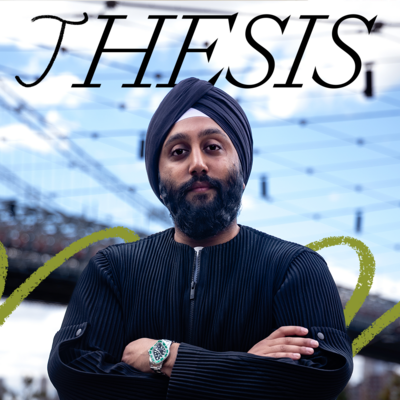.png)
What if the friction that AI eliminates is the key to developing expertise? In our latest piece for Thesis, investor and designer Willem Van Lancker explores how the struggle of learning—for him, through all-nighters, brutal critiques, and hours spent kerning at art school—creates the foundation for mastery and taste. Willem (who is an investor in Every and advised us on our early design) offers a framework for understanding this “productive friction,” drawing a distinction between automation that removes drudgery versus the kind of struggle that builds expertise. In a world where credentials matter less, such proof of work may be our most valuable currency.—Kate Lee
Was this newsletter forwarded to you? Sign up to get it in your inbox.
Three weeks into my first foundations class at the Rhode Island School of Design (RISD), I pulled my first all-nighter. Wrestling with clay, I was convinced I was making something profound. Then came the critique.
Peers and professors dissected every poorly considered curve, every spot where I'd tried hiding incompetence with excess material. They tore my work apart. But that friction, the confrontation with my limitations, carved something permanent into me.
For years, I learned this way: Attempt, fail, dissect, try again. In Color Theory, mixing a hundred shades between two hues. In Typography, I spent hours kerning a series of words until their rhythm felt just right. These weren't arbitrary exercises; they etched precise grooves in my perception. It was specific and cumulative. Friction eroded poor execution and clumsy ideas until something simpler and more elegant was revealed.
Trial, error, filling skill gaps, honing hand and eye: it was reinforcement learning built through thousands of small decisions I'd been forced to defend or abandon. I carried this mindset to my design work at Apple, Google Maps, and later my own startup, Oyster.
But friction, once an indispensable process of building competency and perspective, is vanishing to AI. A single prompt generates polished landing pages, completes brand systems, and ships working applications. The fruit that once required long, arduous labor now drops directly into our laps, ripe yet uncannily hollow.
Automation threatens millions of jobs, but beyond near-term economic pain is a deeper concern. Entry-level roles stand to be disproportionately affected—the places where, for generations, people went to accumulate experience and learn their craft. Knowledge risks becoming merely transactional, a commodity to be accessed, rather than relational or internalized. Information on tap instead of an ongoing dialogue with ourselves and the world. We should use automation to take away mundane obstacles and drudgery. I do. But we must recognize the distinction between that and what I call productive friction. This is the kind of difficulty that’s worth preserving, the kind of struggle that pushes you forward as you push against it.
The trick is in knowing what to look for.
Test your products faster than ever
Big companies test their products relentlessly. Don’t let being small hold you back. Ability AI automates Meta ad campaigns with just your product URL. Get copy, images, and precise targeting to reach new customers within minutes. Their agentic AI learns from your approvals and disapprovals.
Find the right audiences with a fraction of the time and cost.
The path of more resistance
Productive friction has three main principles:
- Immediate feedback: You understand when you've failed and can see why.
- Cumulative learning: Each attempt builds your reference library.
- Transferable principles: The specific teaches the general.
This manifests differently in different fields. But it’s universal. It’s also the foundation of building taste. Taste is often held up as an irreducibly human thing, the saving grace of our uniqueness in the AI age. But taste isn’t something anyone is born with or even a deterministic goal. The focus placed on it mistakes the output for the input. And when you ask what people mean by taste, typically they’ll stumble around for a bit before landing on something like “you know it when you see it,” or list off some nice-looking design features that have been sold to them as “craft.”
Taste isn’t any one thing. It is your thing. And it’s a product of friction.
Taste is an accumulated ability, earned through making and repeated discernment. It cannot be shortcut or passively consumed. It can only bloom through practice, care, and cumulative experience. Friction isn't inefficiency to be eliminated. It's the resistance necessary to build genuine judgment and refine taste. Its value doesn't lie in the final product but in the work itself. AI allows production without labor, creating the illusion of progress while sidestepping much of the actual learning.
AI might push toward immediate legibility or conventions, but taste—my own, for instance, shaped by American sportswear, early internet aesthetics, graphic design history, and specific cultural elements from New York City and New England—is an accumulation earned only through repeated struggle in unforgiving studios, offices, and workshops. Friction, in other words.
It works in subtle, but discernible, ways.
Friction forces articulation. In those RISD critiques, “I just liked it better” meant blank stares and humiliation. I learned to identify and name what I was seeing: the way warm gray advances while cool gray recedes, how a curve that accelerates too quickly feels anxious and disjoint.
It builds pattern libraries. After hand-kerning enough headlines, researching enough papers, you internalize rhythms. After mixing enough chemicals, you predict how they will interact. This allows you to remix and build on a strong foundation.
Friction also develops conviction through contestation. When peers attacked my composition, defending successful elements while acknowledging weak points taught me to distinguish personal preference from universal principles. This conviction becomes a position you can articulate clearly beyond “I like it.”
This phenomenon isn’t exclusive to design. A chef adjusts seasoning instinctively because they've oversalted dishes thousands of times. Carpenters anticipate how walnut splits because they've felt it crack beneath their chisels. Mechanics hear subtle engine faults after years of troubleshooting rattles.
Automation streamlines tasks but inhibits mastery. Junior developers who only lean on AI may struggle to debug from first principles; writers who exclusively prompt can’t structure an original argument. They become adept at generating outputs, but become disconnected from foundational insights.
The solution isn't to abandon AI but to be intentional about where friction remains and matters. In my own work, I am constantly using AI (as much as possible); it would be stubborn and short-sighted not to. But like any tool or collaborator, it requires thoughtful restraint and careful judgment of when to engage.
Before starting a project, I clarify what kind of answer I actually need. AI can instantly deliver plausible solutions, but are those solutions meaningful, or just comfortably convincing? When approaching design, I first sketch by hand to avoid tool-driven thinking, and ensure simplicity and clarity from the start. With branding projects, I intentionally let ideas simmer, accumulating influences through serendipitous wandering rather than rushing to resolution. When writing, I commit to an initial full draft—raw and messy if necessary—before seeking AI-assisted refinements. Most critically, when learning something new, I go straight to primary sources rather than settling for summaries or shortcuts.
This intentional friction keeps my thinking sharp and ensures that when I do engage with automation, I do so from a place of genuine understanding and deliberate choice.
The proof-of-work world
How do we recognize genuine expertise now? For generations, we’ve looked to credentials, like degrees attained and company names on resumes. Increasingly, the proof is in the outputs: visible friction, evidence of struggle, and personal investment made tangible.
Today, it's harder for many to find a first job, yet never easier to create your first opportunity. Human labor is shifting toward adept humans leveraging AI to accomplish vastly more. In this emerging world, proof of work replaces credentials and titles. What matters is what you've made or shipped, not what degrees you have or where you got them. A teenager building their own thriving app; a Shopify intern candidate proactively pitching themselves; a student provocatively challenging university administrators. This is friction made manifest. Knowledge gained from this kind of experience cannot be prompted into existence; it must be earned.
How do you do this work? Simple: Do it. Try lots of things, fast. Bring people along with what you are doing. Instead of trying to climb some arbitrary career ladder, consider following experiments and ideas that draw you in. Every hour spent wrestling with software, every failed print run, every brutal critique creates part of a foundation that you’ll later need to place bigger bets and call bolder shots.
The choice
The world divides in two. On one side: utility, stripped of mystery, measured in speed, cost, and precision. Frictionless. On the other: meaning, full of ambiguity, judged by story, risk, and personal intent. AI is conquering the first. It should. Let it drive the bus, draft the forms, color-correct the photo, and sand some of the rougher edges. Then you can focus on what matters. Preserve friction where it counts, not as nostalgia or high-minded purism, but as method and meaning. This approach will better prepare us to work successfully in the AI age. Offload the boring. Keep the stakes.
Years later, I finally understood my professor’s lesson. The point wasn't to produce flawless art; it was to develop the judgment that can only come from having your hands in the material and experiencing intentional struggle.
That failed clay sculpture? I kept it. In a world rushing to remove the struggle, it reminds me that friction was never the enemy. It was always the teacher.
Read more about Willem's philosophy as well as 10 tips for cultivating productive friction in your own life.
Willem Van Lancker is a partner at Terrain, an early-stage technology investment firm. He previously founded Oyster (acquired by Google), led incubations at Thrive Capital, and designed products at Google Maps and Apple. He writes regularly on design and technology, and you can follow him on X at @vanlancker.
To read more essays like this, subscribe to Every, and follow us on X at @every and on LinkedIn.
We build AI tools for readers like you. Automate repeat writing with Spiral. Organize files automatically with Sparkle. Deliver yourself from email with Cora.
We also do AI training, adoption, and innovation for companies. Work with us to bring AI into your organization.
Get paid for sharing Every with your friends. Join our referral program.
The Only Subscription
You Need to
Stay at the
Edge of AI
The essential toolkit for those shaping the future
"This might be the best value you
can get from an AI subscription."
- Jay S.
Join 100,000+ leaders, builders, and innovators

Email address
Already have an account? Sign in
What is included in a subscription?
Daily insights from AI pioneers + early access to powerful AI tools














Comments
Don't have an account? Sign up!